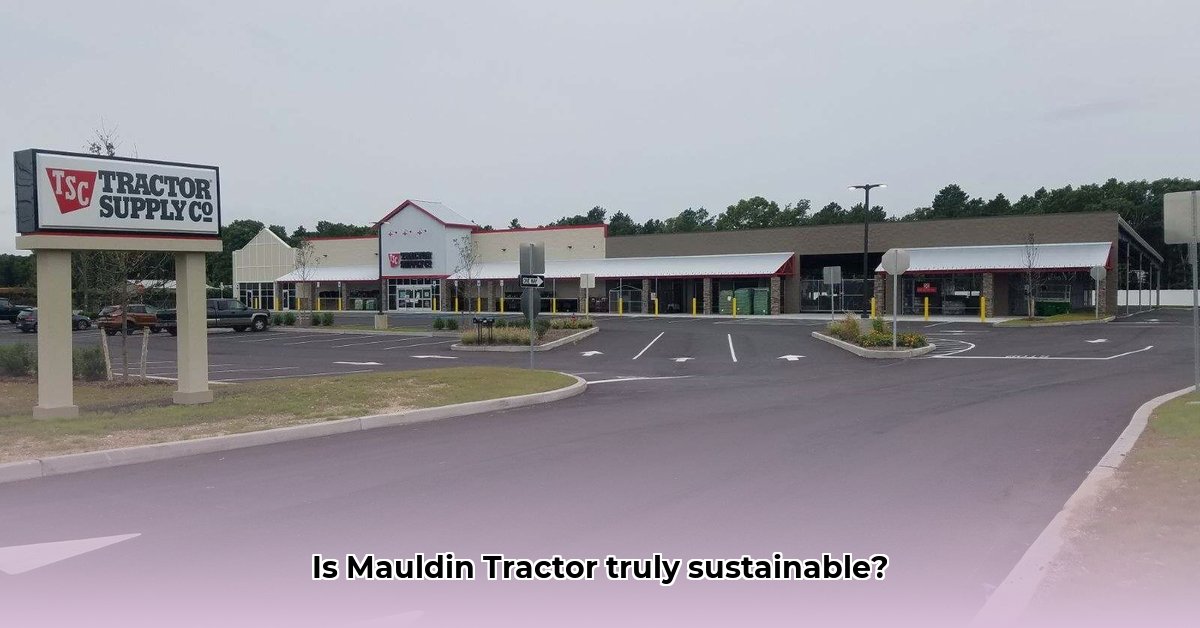
Mauldin Tractor Supply: A Local Hub for Sustainable Agriculture?
Mauldin Tractor Supply, conveniently located in Upstate South Carolina, serves a large agricultural region, including Taylors, Greer, and Greenville. Its accessibility suggests a potential role in supporting sustainable farming practices within the community. For more detailed information about Mauldin Tractor Supply, visit this page. However, a comprehensive assessment of its actual impact requires further investigation. This article explores Mauldin Tractor Supply's potential contribution to sustainable agriculture, highlighting existing data gaps and outlining recommendations for future action.
Accessibility and Community Reach
Mauldin Tractor Supply's central location offers significant accessibility to farmers across the region, minimizing travel time and facilitating access to farming supplies. This readily available access could be instrumental in promoting sustainable farming practices. However, the extent to which this accessibility translates into actual support for sustainable agriculture remains unclear.
Data Gaps: Assessing Sustainable Practices
Significant information gaps currently hinder a comprehensive evaluation of Mauldin Tractor Supply's impact on sustainable agriculture. Crucial data regarding the store's sustainability practices are missing. For example, there is limited publicly available information on:
- Product Sourcing & Transparency: The origins and production methods of the products sold at Mauldin Tractor Supply are largely unknown. The presence of certifications (e.g., organic, sustainable) for various products is also unclear.
- Waste Management Strategies: Detailed information regarding the store's waste reduction and recycling programs is lacking.
- Engagement with Local Sustainable Farmers: The extent of partnerships between Mauldin Tractor Supply and local farmers employing sustainable methods remains undefined. Do they prioritize local, sustainably-produced goods? Information on this is unavailable.
These data limitations prevent a conclusive assessment of the store's current role in fostering sustainable agriculture.
Potential for Sustainable Change: A Vision for the Future
A scenario where Mauldin Tractor Supply actively promotes sustainable agriculture presents a promising vision. This would involve:
- Expanded Inventory: A wider selection of organic and sustainably produced seeds, fertilizers, and other agricultural inputs.
- Strategic Partnerships: Collaborations with local farmers employing sustainable techniques, providing them with market access.
- Educational Outreach: Workshops, informational sessions, and resources educating farmers on environmentally friendly practices.
- Sustainable Operations: The implementation of waste reduction and recycling programs within the store itself.
However, this scenario is currently hypothetical. Realizing this potential requires proactive steps by various stakeholders.
Recommendations and Future Research: A Collaborative Path Forward
Addressing the need for sustainable agriculture in the Mauldin area requires a multi-faceted approach involving several key stakeholders:
Mauldin Tractor Supply: Conduct a comprehensive sustainability audit; transparently report on product sourcing and waste management; expand the range of sustainable products offered; partner with local sustainable farmers; invest in employee training on sustainable agriculture.
Local Farmers: Actively seek out sustainable products; share knowledge and best practices; directly engage with Mauldin Tractor Supply to explore supply opportunities.
Government Agencies: Provide financial incentives and support for sustainable farming; invest in infrastructure supporting sustainable agriculture; fund research into innovative sustainable agricultural methods.
Consumers: Advocate for greater transparency from retailers regarding sourcing practices; actively choose sustainably produced options; support local farmers and businesses committed to sustainable practices.
Further research is critical to bridging the existing data gaps. This includes a detailed assessment of:
- Consumer Demand: Investigating the demand for sustainable agricultural products among local farmers and consumers.
- Supply Chain Analysis: Mapping the supply chains of various products sold at Mauldin Tractor Supply to assess their sustainability.
- Environmental Impact Assessment: Measuring the environmental footprint of different farming practices and the store's role in influencing these practices.
Conclusion: Bridging the Information Gap
The extent of Mauldin Tractor Supply’s contribution to sustainable agriculture remains largely unknown due to significant information gaps. Further research, transparency from the company, and collaborative action among all stakeholders are crucial for understanding and realizing the store’s potential role in fostering a sustainable agricultural future in Upstate, South Carolina. Only through concerted effort can we accurately assess and improve the community’s sustainable food system.